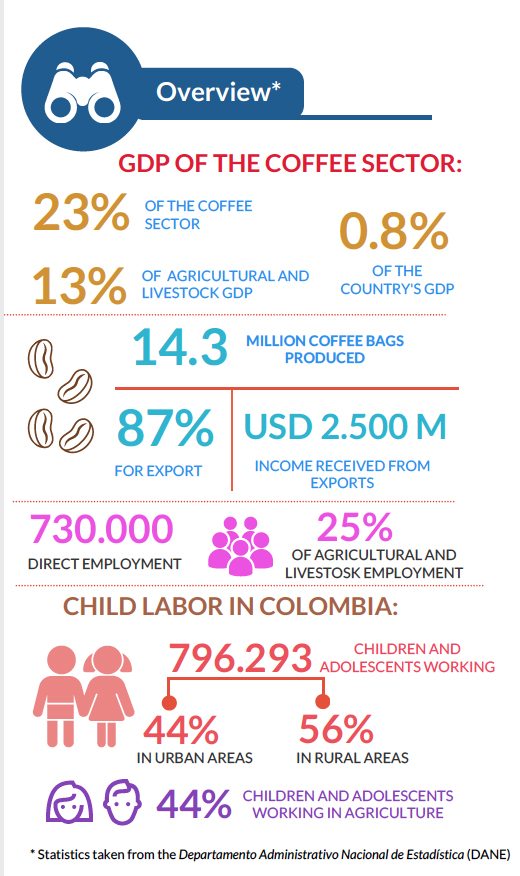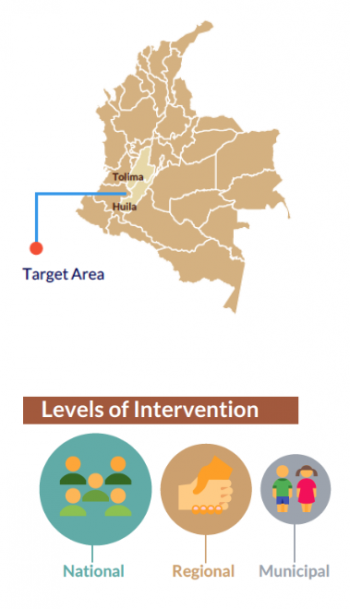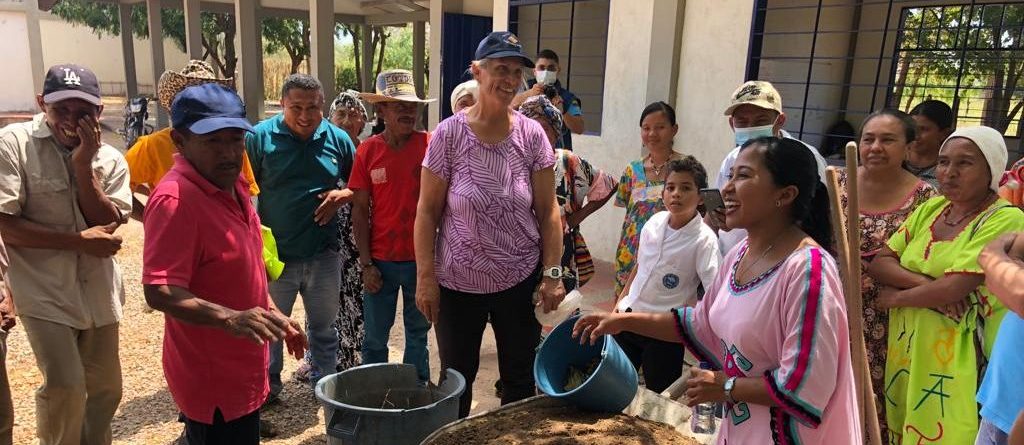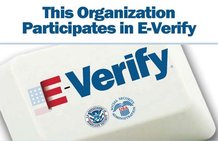Partners connects people and institutions across and within the Americas to create lasting solutions to the hemisphere’s toughest challenges through its Chapters, development programs, and exchange programs.
Explore our map below to learn about Partners’ current Chapters and programs by country.
Regions
Colombia
Partners of the Americas (Partners) has worked in Colombia since 1963, when the Florida and Northeast and Central Colombia Chapter was established. Since then, its history in the country has been characterized by high-impact programs, youth and professional exchanges, and an active in-country volunteer network. Today, Partners has 14 volunteer Colombian Chapters and Partners Campus Student Chapters that drive civic engagement and community development projects.
In 2022, Partners established a Colombian branch office to strengthen and centralize our work in the country. There, the branch implements a dynamic portfolio of development programs in Colombia addressing each of the organization’s thematic priorities: agricultural development and food security (AFS), education, and labor rights.
Programs include:
- Advancing Labor Compliance in Colombia’s Port Sector project (Labor)
- Cacao for Development (AFS)
- Farmer-to-Farmer (AFS)
- Palma Futuro (Labor)
- Juntos Aprendemos (Education)
Chapters
- Capítulo de Antioquia, Colombia
Overview
In 1964 the first cultural exchange between Antioquia and Massachusetts took place through an internship of a group of Textile Technology students from the Technological Institute (EAFIT) of Medellin to the Textile Institute of the city of Lowell (Massachusetts), thanks to this exchange, the establishment of ties of friendship and companionship between peers from Medellin and Boston, and the flourishing of two textile cities very similar in their fordist structures at that time, the flourishing of two textile cities very similar in their fordist structures at that time, and the contacts of Antioquia and Partners leaders in Washington in 1965, in 1966 the statute of the Massachusetts Antioquia Partnership was officially accepted in the State of Massachusetts.
Between 1967 and 1980 cultural exchanges were strengthened through two-way internships, with the support of the Universities of Massachusetts and the Department of Antioquia. Between 1981 and 1997, programs such as: Kellogg Fellows/International Leadership Development, Adventure Colombia, Life Skills, Seeds for the Americas, Food Conservation, Hilton/Perkins International, Rehabilitation and Special Education, Student Exchanges and Teacher Training, Economic Development, Arts and Culture, HIV/AIDS, Health, Women and Family, Sports, Substance Abuse, Disaster Prevention Preparedness, Environmental Protection, Journalism, Home Economics and Nutrition, Community Education, Agriculture, Vision Testing and National Training Policies, among others.
In 1988 the Antioquia Chapter was legally established before the Government of Antioquia through resolution No. 0035981 of June 16, the partnership transferred its assets to the newly created Corporation Procivismo and Social Development of Antioquia, name under which it operated until 1999, when the Partners of the Americas Antioquia Massachusetts Foundation was born, legal figure under which it currently operates.
For the period 2000 - 2015 Partners of the Americas Antioquia - Massachusetts participates in the dialogue and monitoring of projects before national and international agencies and NGOs, through Partners of the Americas in Washington and Massachusetts, where programs such as Sports Exchanges, Climate Change and Legal Rights, have enabled the formation of more than 30 Fellowships in different disciplines.
Through these activities, we seek to develop programs that impact the most disadvantaged communities in Antioquia, achieve the sustainability of the Foundation, and strengthen volunteerism.
Leadership
Chapter Email: [email protected]
Position Name Contact Information* President Felipe Eduardo Marino Isaza Contact Vice President Didier Velez Madrid Contact Secretary J. Alberto Hincapie Lopez Contact Treasurer Hugo Jaramillo Contact (Users must have a PartnersConnect account to access - log in or create one today!)Useful Links
(Users must have a PartnersConnect account to access - log in or create one today!) - Capítulo de Barranquilla
Page under construction. Come back soon!
- Capítulo de Bogotá
Page under construction. Come back soon!
About Partners
- Capítulo de Sur Occidente (Cali)
Overview
The Sur Occidente (Cali) Chapter is an association of professional volunteer members legally constituted in Colombia, founded in 1977, with 40 volunteer members, and with general recognition in education, recreation and sports programs, and cultural and environmental exchanges.
Leadership
Chapter Email: [email protected]
Position Name Contact Information* President Gloria Ortiz Contact Vice President Mario German Barbosa Contact Secretary Luz H. Arango Contact *(Users must have a PartnersConnect account to access - log in or create one today!)Useful Links
(Users must have a PartnersConnect account to access - log in or create one today!) - PartnersCampus CEENIUG
- PartnersCampus CMAN
- PartnersCampus Fundación Tomas Rueda Vargas
- PartnersCampus Kilele
- PartnersCampus SENA CFC
- PartnersCampus UniAtlántico
- PartnersCampus UniNorte
- PartnersCampus UniNúñez
- PartnersCampus Universidad EAFIT
100,000 Strong in the Americas

The 100,000 Strong in the Americas (100K) Innovation Fund expands opportunities for higher education institutions to create partnerships and launch innovative student exchange and training programs. This opens access to underrepresented student populations, improves workforce development training, increases public-private investment, and strengthens people-to-people ties between the United States and Latin America and the Caribbean.
Education exchanges have long been used as a tool to foster international cooperation and promote technical, linguistic, and intercultural skills development for students to operate in an increasingly globalized world. Created in 2013 by the White House’s National Security Council, the U.S. Department of State’s Bureau of Western Hemisphere Affairs, Partners of the Americas, and NAFSA: Association of International Educators, the 100K Innovation Fund is an impactful hemisphere-wide education initiative that creates dynamic regional collaboration across the private sector, foundations, government entities, NGOs, and academia to support higher education partnerships and increase the number and diversity of students in the Americas who have access to innovative training and exchange programs.
Unlike traditional scholarship programs, which support individual students or faculty, the 100K Innovation Fund stimulates innovation at the institutional level and provides critical funding on a competitive basis to higher education institutions across the Americas to build partnerships that result in innovative student exchange and training programs that are scalable and sustainable. To learn more about 100K Innovation Fund grants and other opportunities, visit https://www.100kstrongamericas.org.
$9.8Million in grants awarded25Countries and 49 U.S. states and territories benefited from grant programs572Higher education institutions formed partnerships for international collaboration7,100+Student and faculty beneficiariesAdvancing Labor Compliance in Colombia’s Port Sector

The Advancing Labor Compliance in Colombia’s Port Sector Project (CPP) works to improve Colombia’s compliance with local and international labor rights including freedom of association, collective bargaining, prohibition against discrimination at work, elimination of forced labor and child labor, and rights to acceptable conditions of work with respect to minimum wages, hours of work, and occupational health and safety.
Funded by the U.S. Department of Labor (USDOL), this project will be implemented from December 2020 to December of 2024.
CPP will implement innovative strategies to build a common understanding of the problems in the sector, co-design solutions to the issues, and design interventions based on the results and needs of the sector. The initial interventions will focus on understanding labor intermediation and outsourcing regulations; promoting Social Dialogue in the port sector; and strengthening ports workers organizations’ capacity to advocate for the rights of workers. Partners and the collaborating institutions aim at creating a more just workplace environment in Colombia’s port sector.
Funding is provided by the United States Department of Labor under cooperative agreement number IL-35742-20-75-K. 100% of the total costs of the project is financed with federal funds, for a total of U.S. $5,000,000 dollars. This material does not necessarily reflect the views or policies of the United States Department of Labor, nor does mention of trade names, commercial products, or organizations imply endorsement by the United States Government.
49Stakeholder organizations, including government, unions, private sector, civil society, and NGOs validated the initial findings on the main challenges facing the port sector1Memorandum of Understanding (MOU) signed with the Sindicato Nacional de Trabajadores de Rama, Servicios de la Industria del Transporte y Logística de Colombia – SNTT to coordinate efforts with CPP460Workers interviewed in the ports of Buenaventura, Barranquilla, Cartagena and Santa Marta to assess their working conditionsCacao for Development

Cacao for Development (C4D) aims to strengthen Colombia’s cacao sector by supporting cacao farmers attain economically viable diversified farming systems, sustainable agricultural landscapes, and equitable commercialization models.
As a key agricultural product of Colombia for both domestic consumption and export, cacao has the potential to forge peace in rural communities. However, environmental shocks and volatile prices mean farmers cannot earn a livable income through cacao production alone.
C4D is a US$25M investment funded by the United States Department of Agriculture that brings together government, NGOs and private sector allies to improve cocoa and complementary supply chains in Colombia. The project evolves around three verticals: Value Chain optimization, Living Income and Carbon capture by the cacao agroforestry system. We aim to increase productivity and livelihoods of the farmers by intervening in ways that promote sustainable business models and expand trade between the U.S. and Colombia.
5,455Farmers estimated to be trained to diversify crops and improve agricultural productivity57Farmer organizations estimated to improve leadership capacity and marketing skills77Grants for farmer organizations, small businesses, young entrepreneurs, and researchers4Areas of operation: Magdalena and Cesar; Antioquia and Córdoba; Caldas, Tolima, and Huila; and SantanderCareers
See AllFarmer-to-Farmer

Connected with the right resources and training, rural farmers and agribusinesses can improve production and gain greater access to economic opportunities.
Agriculture is key to improving food security and nutrition in Latin America and the Caribbean.
Since 1991, Partners’ Farmer-to-Farmer (F2F) program has been transforming lives in over 30 countries in Latin America, the Caribbean, Africa and Asia. F2F connects specialized volunteers from the United States with farmers, cooperatives, agribusinesses, extension services, government agencies and other institutions. F2F is funded by the U.S. Agency for International Development (USAID).F2F volunteers provide technical assistance on practical interventions that increase food production and income, improve farm and agribusiness operations, help farmers gain access to markets, build local capacity, and conserve natural resources. Volunteers not only offer much-needed training, they also build meaningful relationships, fostering mutual understanding and respect. The 2018-2023 program focuses on Guatemala, the Dominican Republic, Jamaica, Colombia, Guyana and Burma, as well as other select countries in the region. A projected 610 volunteer experiences will be completed over the next five years.
Check out the F2F country strategies:
Watch more F2F Success Stories
503Volunteer assignments completed60K+Hectares improved23K+People trainedRelated Stories
See AllThe Agricultural Volunteer Opportunity Project (AVOP)

The Agricultural Volunteer Opportunity Project (AVOP) serves two primary functions: first, AVOP partners with eight organizations to help grow their capacity to implement small Farmer-to-Farmer (F2F) programs through a sub-award program. Sub-awards are active around the globe in Morocco, the Philippines, Burkina Faso, Trinidad and Tobago, Cambodia, Guatemala, and the Bahamas.
Second, AVOP provides knowledge management services to the eight F2F implementing organizations by offering seminars, organizing annual meetings, and managing the F2F website and social media accounts.
223Volunteers will complete assignments under AVOP projects5,744People will be trained by volunteers19Workshops and seminars will be held for the F2F community
Juntos Aprendemos

Strengthening the Colombian education system’s capacity to deliver inclusive and quality education in communities impacted by migration.
Juntos Aprendemos (JA) is a five-year program funded by The United States Agency for International Development (USAID). JA aims to increase the capacity of the Colombian education system to provide sustainable and inclusive quality education to children and adolescents (ages 3-17) in areas impacted by migration.
In 2021, the JA program began its endeavor towards strengthening the capacity of Colombia’s educational system so that it can provide children and youth access to quality education while promoting community participation. JA responds to the challenges facing the Colombian educational system such as social-emotional challenges, school permanence, COVID -19, the resilience of the Colombian education system, and the high influx of a school-aged migrant population in recent years, through three main objectives:
- Improve the quality of education by supporting the development of learning environments that are safe, inclusive, and responsive to learners’ needs. JA will build the capacity of local and national government actors and strengthen the ability of educators to provide better instruction in critical and fundamental skills such as math, literacy, and social-emotional learning.
- Increase access to education by working with Civil Society Organizations (CSOs) and local government actors to increase the number of learners registered in the Colombian enrollment system, promote access to Accelerated Learning Models, and improve children’s and adolescents’ access to legal support, protection, and psychosocial support.
- Strengthen community participation by empowering community stakeholders, such as parent-teacher associations, to participate in education-related decision-making and in offering services; and increasing the involvement of families and caregivers, in developing community activities that forge relationships between families, schools, businesses, and social protection actors.
JA is the first New Partnerships Initiative (NPI) to be implemented by USAID/Colombia. NPIs aim to diversify the range of partners USAID works with and build leadership, capacity, transparency, and accountability through collaboration with new, non-traditional, and local actors. JA works together with its partners to ensure local priorities are incorporated into the program and that the partners have a voice in the decision-making process.
The JA consortium: Partners of the Americas, Proantioquia, Parque Explora, and Fundación Carvajal.
Who we work with: Local and national actors such as the Ministry of Education, Secretaries of Education, the Colombian Family Welfare Institute (ICBF), Civil Society Organizations (CSOs), private sector actors, and others, in order to understand the barriers and bridge the gaps in access to education for children and adolescents.
Where we work: JA is implemented in areas with large populations of Venezuelan migrants and Colombian returnees, including Barranquilla, Bogotá, Bucaramanga, Cali, Cartagena, Cúcuta, Medellín, Riohacha, and Santa Marta.


For more information on JA, see the following links: Instagram | Facebook | Twitter | YouTube | JA Factsheet | Aula Global
400Schools and educational institutions reached14Secretaries of Education strengthened130,000+Primary students and 60,000+ secondary students assistedPalma Futuro

Reducing Child and Forced Labor in the Palm Oil Sector
Palma Futuro is a project funded by the U.S. Department of Labor (USDOL) and implemented by Partners of the Americas and its partners, Social Accountability International (SAI) and J.E. Austin Associates (JAA).
Working closely with leading private sector partners in the palm oil sector, Palma Futuro aims to improve the implementation of social compliance systems that promote acceptable conditions of work and reduce child labor and forced labor in palm oil supply chains in Colombia and Ecuador. It will also disseminate best practices in social compliance systems in these and other palm oil-producing countries, particularly Brazil and Peru.
Palma Futuro is guided by two expected outcomes: 1) Strengthened capacity of private sector partners in the Colombian and Ecuadorian palm oil sector to implement a robust and sustainable social compliance system, and 2) Increased understanding, at regional and global levels, of promising practices in social compliance systems in palm oil supply chains.
A comprehensive and suitable social compliance system will be executed by three of the most prominent companies in the palm oil sectors of Colombia and Ecuador, BioCosta, Palmas del Cesar, and Danec. Palma Futuro will adapt and use resources developed under the Social Fingerprint Management Systems Program, a set of ratings, trainings, and tools developed by SAI that break down the management systems concept into component processes and five maturity levels. Modules in this program will include a self-assessment, independent evaluation, and improvement plan for each company.
Palma Futuro will conduct a study on the prevalence, nature, and risks of child labor, forced labor, and labor conditions in the palm oil sectors in Colombia and Ecuador and disseminate the targeted research. Additionally, implementing partner JAA will conduct a market analysis and a value-chain mapping to identify the value of labor compliance and promote the implementation of social compliance systems as an opportunity for improved economic performance. Ultimately, Palma Futuro will socialize three case studies prepared by JAA and disseminate best practices in social compliance in Colombia, Ecuador, Brazil, and Peru. This regional and global collaboration strategy will include participation in international forums, development of national workshops in the target countries, and knowledge management of lessons learned throughout the project.
Funding is provided by the United States Department of Labor under cooperative agreement number IL-32820-18-75-K. 100% of the total costs of the project is financed with federal funds, for a total of U.S. $6,000,000 dollars. This material does not necessarily reflect the views or policies of the United States Department of Labor, nor does mention of trade names, commercial products, or organizations imply endorsement by the United States Government.
7Private Sector Partners trained in components of Social Compliance Systems (SCS) and COVID-1996Oil palm fruit suppliers trained in components of SCS and COVID-19112Workers trained in components of SCS and COVID-1936Communities reached with awareness activities on labor issues with a focus on COVID-19Past Programs
Colombia Avanza

The Colombia Avanza project aimed to improve the capacity of civil society to better understand and address child labor and promote acceptable conditions of work in Colombia’s coffee sector.
By 2021, the program aimed to improve the capacity of civil society to identify and document information on the nature/scope of child labor and/or forced labor, and violations of acceptable conditions of work in the coffee sector. Colombia Avanza was funded by the U.S. Department of Labor.
Want to learn more about what Partners was doing in Colombia? Watch Eduardo Bejarano, Project Director of Colombia Avanza, explain how this Partners' project combatted child labor and forced labor in the Colombian coffee sector.


The Expected Outcomes were:
- 1. Improved the capacity of civil society to identify and document information on the nature and scope of child labor and/or forced labor, and violations of acceptable conditions of work in the coffee sector.
- 2. Improved the capacity of civil society to raise awareness for the protection of workers from child labor and violations of acceptable conditions of work.
- 3. Strengthened civil society’s capacity to understand enforcement of policies and action plans that are relevant, accessible, and responsive to the nature of child labor and/or forced labor and violations of acceptable conditions of work in Colombia’s coffee sector.
Learn more about Colombia Avanza.
Read about Colombia Avanza news updates here.
Funding was provided by the United States Department of Labor under cooperative agreement number IL-31475-17-75-K. 100% of the total costs of the project were financed with federal funds, for a total of U.S. $2,000,000 dollars. This material does not necessarily reflect the views or policies of the United States Department of Labor, nor does mention of trade names, commercial products, or organizations imply endorsement by the United States Government.7Awareness-raising campaigns conducted focused on the prevention and eradication of child labor920Members of civil society organizations trained on topics of child labor and acceptable conditions of work; communications and civic participation; public policy; youth leadership; and occupational safety and health2Partner civil society organizations successfully inducted as permanent members of the Colombian Network Against Child Labor














